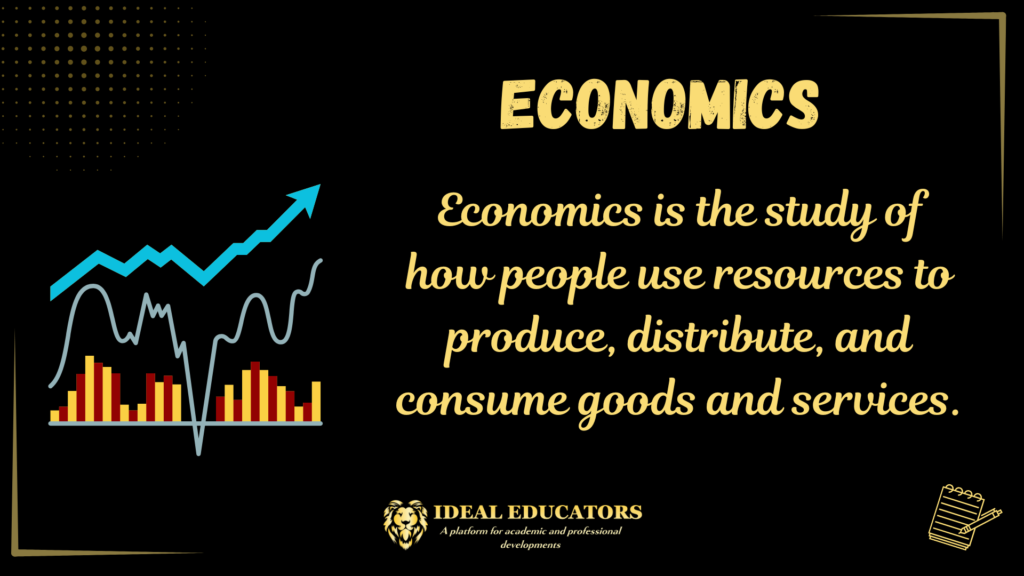Note: These notes are specially designed for B.COM, ADD, and BS Commerce students. They are tailored to match the difficulty level and depth needed for graduation exams. Many students have found these notes very helpful in achieving top marks.

What is Economics
Economics is the study of how people use resources to meet their needs and wants. It is all about making choices and understanding the consequences of those choices. Resources can be anything from money, time, and labor to raw materials and technology. Economics helps us understand how these resources are distributed and used in society.
The Basics of Economics
At its core, economics is divided into two main branches: microeconomics and macroeconomics.
Microeconomics focuses on the decisions made by individuals and businesses. It looks at how they interact in markets, how prices are set, and how resources are allocated. For example, microeconomics can explain how a family decides to spend its income or how a company determines the price of its products.
Macroeconomics, on the other hand, looks at the economy as a whole. It deals with larger-scale economic factors like national productivity, inflation, and unemployment. For instance, macroeconomics helps us understand why a country might experience a recession or how government policies can impact overall economic growth.
Scarcity and Choice
One of the fundamental concepts in economics is scarcity. Scarcity means that resources are limited, while our wants and needs are unlimited. Because of this, we have to make choices about how to use these limited resources most effectively.
Example: Imagine you have $10 to spend. You can either buy a book you want to read or go to the movies with your friends. You cannot do both because your money is limited. The choice you make is influenced by what you value more at that moment.
Opportunity Cost
Every choice we make has an opportunity cost. Opportunity cost is the value of the next best alternative that you give up when you make a decision. It’s what you sacrifice in order to get something else.
Example: If you decide to spend your $10 on the book, the opportunity cost is the fun experience you would have had at the movies. If you go to the movies, the opportunity cost is the enjoyment and knowledge you would have gained from reading the book.
Supply and Demand
Another key concept in economics is supply and demand. Supply refers to how much of a good or service is available, while demand refers to how much people want that good or service. Prices are determined by the interaction of supply and demand.
Example: If a new video game is released and everyone wants it (high demand), but there are only a few copies available (low supply), the price of the game will likely be high. Conversely, if a product is abundant (high supply) but not many people want it (low demand), the price will be lower.
Economic Systems
Different societies have different ways of organizing their economies. The main types of economic systems are:
- Market Economy: Decisions about production and consumption are made by individual producers and consumers. Prices are determined by supply and demand. Example: The United States.
- Command Economy: The government makes all decisions about production and distribution. Example: North Korea.
- Mixed Economy: Combines elements of both market and command economies. Example: Many modern economies, including Canada and Sweden, fall into this category.
Real-Life Application
Economics is not just about theories; it affects our daily lives in many ways. Understanding economics can help us make better personal financial decisions, such as saving money, investing, or choosing a career. It also helps us understand broader issues like why prices rise (inflation) or how government policies impact our well-being.
Example: During the COVID-19 pandemic, governments around the world implemented various economic policies to support people and businesses. By studying these actions through the lens of economics, we can understand their impact on unemployment rates, business closures, and economic recovery.
Conclusion
Economics is a vital field that helps us understand the world around us. It teaches us about scarcity, opportunity cost, and how supply and demand shape our lives. By grasping these concepts, we can make informed decisions and better appreciate the complexities of our economy. Whether you’re managing your personal finances or analyzing global economic trends, the principles of economics are invaluable tools for navigating the world.
Disclaimer
This blog post is written and verified by Mr. Shayan and the Business team at Ideal Educators.
Ideal Educators is a renowned non-profit educational organization offering a wide range of services, including Business and Economics tutoring, Teacher training, Leadership training, Business consultancy, Immigration and Educational advice and consultation (affiliated with registered organizations), and IELTS tutoring.
Mr. Shayan is a successful entrepreneur, accomplished author, expert business coach, economist, and qualified educator, leading several businesses with excellence.
